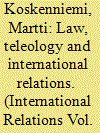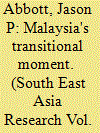| Srl | Item |
| 1 |
ID:
112421


|
|
|
|
|
| Publication |
2012.
|
| Summary/Abstract |
Interdisciplinary approaches often bemoan international law's lack of theoretical sophistication and naïve utopianism. Instead of offering effective tools of governance, it seems committed to outdated ideas about an international public realm and a dubious teleology of progress. This essay - given as the E. H. Carr lecture at the University of Aberystwyth in 2011 - reviews efforts to reform international law into a science and a more efficient instrument of international rule. Such efforts have been a part of international law's internal development but their lack of success depends on a mistaken view of the field as a 'discipline' - a set of theoretical or technical propositions. This essay defends a view of international law as an argumentative practice in which political claims are defended and attacked, rather than as a governance tool or institutional blueprint. At its worst, law may buttress bureaucratic privilege. At its best it may offer, for a cynical world, a vocabulary for imagining better futures. It may also sharpen political thought and strategic awareness, but it cannot replace them.
|
|
|
|
|
|
|
|
|
|
|
|
|
|
|
|
| 2 |
ID:
089883


|
|
|
|
|
| Publication |
2009.
|
| Summary/Abstract |
Many theorists of democratization transition have, either explicitly or implicitly, a teleological concept of political progress, liberalization and reform. For such theorists, countries such as Malaysia are therefore in transition towards substantive 'full' liberal democracy. Taken in this light, the significant advances by opposition political parties in the 2008 federal and state elections in Malaysia represent a major advance towards this end goal. While many have highlighted that Malaysia may in fact be an exception to this rule, this paper contends instead that the Malaysian case study challenges the central tenets of democratic transition more profoundly. Indeed, since independence the Malaysian regime has proved remarkably resilient and resistant to pressures for political liberalization.
|
|
|
|
|
|
|
|
|
|
|
|
|
|
|
|